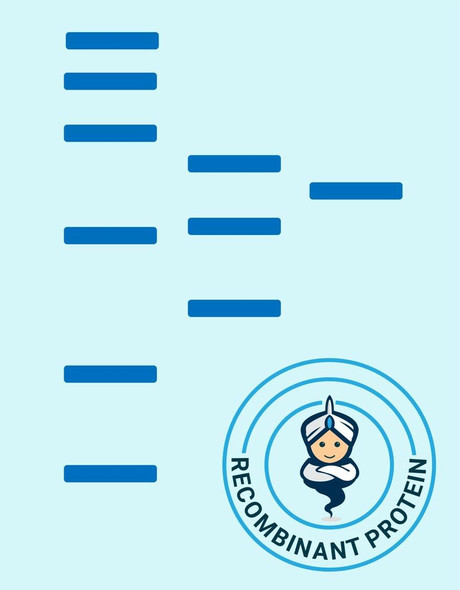Description
| Product Name: | Human CHD4 Recombinant Protein |
| Product Code: | RPPB3166 |
| Size: | 20µg |
| Species: | Human |
| Target: | CHD4 |
| Synonyms: | Chromodomain Helicase DNA binding protein 4, Mi-2b, Mi2-BETA, CHD-4, ATP-dependent helicase CHD4, Mi-2 autoantigen 218 kDa protein, EC 3.6.4.12, EC 3.6.1. |
| Source: | Sf9 Insect cells |
| Formulation: | CHD4 is supplied in 20mM HEPES buffer pH-8.0 and 500mM NaCl. |
| Stability: | Store at 4°C if entire vial will be used within 2-4 weeks. Store, frozen at -20°C for longer periods of time. Avoid multiple freeze-thaw cycles. |
| Purity: | Greater than 95% as determined by SDS-PAGE. |
CHD4 is a member of a family of alleged chromodomain helicase-DNA-binding proteins. Biochemically, CHD4 is a component of the nucleosome transformation and deacetylase (NuRD) complex that takes part in transcription regulation. Autoantibodies targeting the CHD4 are a serologic feature of idiopathic inflammatory myopathies (IIM). In IIM Mi-2 antibodies are characterized by diagnostic sensitivity and specificity of approximately 4-18% and 98-100%, respectively. Moreover, anti-CHD4 antibodies are related to dermatomyositis (frequency up to 31%) and have a great positive predictive value for this type of disease subset. Anti-CHD4 are the only defined myositis-specific autoantibodies clearly focused to a nuclear target. An additional slightly outstanding feature of Mi-2 antibodies relates to their frequency in children, which is similar to that in adults.
CHD4 is a full-length cDNA coding for the human Mi-2�beta isoform having a molecular mass of 221,298 Dalton (pH 5.8). CHD4 protein is fused to a hexa-histidine purification tag.
| UniProt Protein Function: | Component of the histone deacetylase NuRD complex which participates in the remodeling of chromatin by deacetylating histones. |
| NCBI Summary: | The product of this gene belongs to the SNF2/RAD54 helicase family. It represents the main component of the nucleosome remodeling and deacetylase complex and plays an important role in epigenetic transcriptional repression. Patients with dermatomyositis develop antibodies against this protein. Somatic mutations in this gene are associated with serous endometrial tumors. Alternative splicing results in multiple transcript variants encoding different isoforms. [provided by RefSeq, Jul 2014] |
| UniProt Code: | Q14839 |
| NCBI GenInfo Identifier: | 311033360 |
| NCBI Gene ID: | 1108 |
| NCBI Accession: | Q14839.2 |
| UniProt Secondary Accession: | Q14839,Q8IXZ5, |
| UniProt Related Accession: | Q14839 |
| Molecular Weight: | 278 kDa |
| NCBI Full Name: | Chromodomain-helicase-DNA-binding protein 4 |
| NCBI Synonym Full Names: | chromodomain helicase DNA binding protein 4 |
| NCBI Official Symbol: | CHD4�� |
| NCBI Official Synonym Symbols: | CHD-4; Mi-2b; SIHIWES; Mi2-BETA�� |
| NCBI Protein Information: | chromodomain-helicase-DNA-binding protein 4 |
| UniProt Protein Name: | Chromodomain-helicase-DNA-binding protein 4 |
| UniProt Synonym Protein Names: | ATP-dependent helicase CHD4; Mi-2 autoantigen 218 kDa protein; Mi2-beta |
| Protein Family: | Chromodomain-helicase-DNA-binding protein |
| UniProt Gene Name: | CHD4�� |






